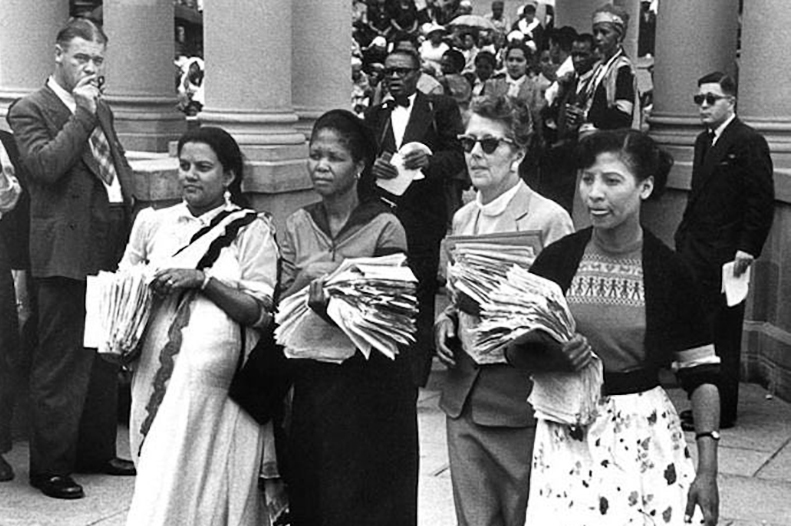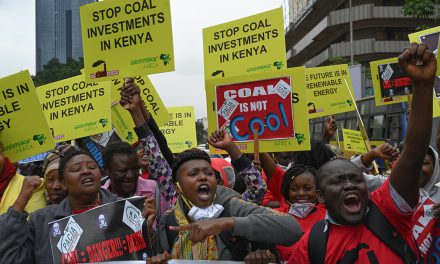In a world that continues to grapple with gender inequality, National Women’s Day serves as a poignant reminder of the indomitable spirit of women and the ongoing struggle for their rights in South Africa. This annual observance pays homage to the historical strides of women in the country, while shining a spotlight on the modern-day challenges that persist. As we honour this pivotal day, it’s crucial to delve into its significance, historical roots, and the remarkable progress made toward gender parity notwithstanding the prevailing challenges for women not only in Africa but also in the world.

Rahima Moosa, Lilian Ngoyi, Helen Joseph, and Sophia Williams-De Bruyn
National Women’s Day is rooted in the iconic march that unfolded on 9 August 1956. Over 20,000 women, representing diverse racial backgrounds, united to strongly protest the amendments to the Urban Areas Act of 1950. This pernicious law compelled black South Africans to bear internal passports, more colloquially known as “dompas”, literally meaning the “stupid pass”, a mechanism designed to enforce segregation, monitor urbanisation, and regulate migrant labour during the apartheid era. Guided by the resolute leadership of individuals like Lilian Ngoyi, Helen Joseph, Rahima Moosa, and Sophia Williams-De Bruyn, these women etched their legacy in history by orchestrating a peaceful march to the Union Buildings in Pretoria.
Their tenacity reverberates across generations. The march culminated in the submission of petitions containing an astounding 100,000 signatures to the prime minister’s office, accompanied by an impactful half-hour silent protest. This solemn moment was punctuated by the haunting yet empowering strains of a specially composed anthem, “Wathint’ Abafazi Wathint’ imbokodo,” loosely translating to “You Strike a Woman, You Strike a Rock ” – an ode to women’s unyielding fortitude.
National Women’s Day is not merely a commemorative marker; it is a testament to the enduring vitality of women’s rights. While it officially acquired the status of a public holiday in 1995, its resonance has spanned far and wide. This day isn’t just about historical retrospection; it serves as a platform to underscore the ongoing issues confronting women in South Africa and the broader world. It underscores the sobering realities of domestic violence, workplace discrimination, unequal remuneration, and the continued struggle for girls’ access to education. Against this backdrop, the trajectory of women’s representation in government is particularly compelling, with women now constituting an impressive 48% of governmental bodies.
As National Women’s Day evolves, it transforms into a vessel for raising awareness about gender inequality and women’s rights. It encapsulates a homage to historical battles and a clarion call for a more egalitarian society. This day manifests as a celebration of the achievements of women across realms. Women are granted respite from their daily chores and responsibilities, offering them a temporary reprieve. Workplaces embrace the occasion to acknowledge the manifold contributions of women, often hosting miniature festivities. Moreover, National Women’s Day serves as an opportunity to spotlight women who have defied the odds and carved their own paths. Socially, women come together to revel in their shared experiences, while businesses offer special deals and discounts as a tribute to womanhood.
While National Women’s Day encapsulates remarkable progress, it is imperative to remember that the journey towards gender equality remains arduous. Stark statistics serve as a stark reminder of the extensive ground yet to be covered. Women’s rights necessitate multifaceted attention – legislative reform, societal shifts, and cultural transformations are all pivotal. Tackling issues ranging from workplace discrimination to ensuring girls’ unhampered access to education calls for concerted efforts.
On this National Women’s Day, we don’t merely reflect on history; we envision a brighter, more equitable future. The strides made by women across the globe underscore their resilience, determination, and capacity for change. But these advances are a call for sustained action, not complacency. As we this day, let us channel our energies into advocacy, education, and reform. This day isn’t confined to the calendar; it’s a constant reminder that empowerment knows no boundaries.
Let’s seize this opportunity to elevate conversations, advocate for change, and foster a society where women’s rights are not aspirational, but actualised. As we commemorate this day, let us remember the women who blazed trails, and those who continue to defy expectations. National Women’s Day is a reminder that while progress has been made, the march towards true gender equality has only just begun.
Chrissy Dube is the Chairperson of the GGA Management Committee and also a member of the GGA Executive Committee. She is Head of Governance Insights and Analytics at Good Governance Africa. She completed her Master of Commerce Degree at the University of KwaZulu-Natal in 2013. She also has qualifications in Advanced Project Management, Data Analysis, Ethics, and Compliance. With her experience in interrogating data, Chrissy specialises in analysing and interpreting data for informed decision-making in both the private and public sectors. Chrissy is a registered member of the Institute of Risk Management South Africa. Her interests include monitoring economic and social developments.












